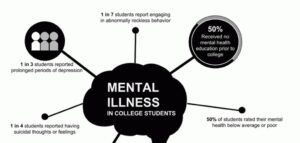
Mental health care in schools is an important issue that deserves attention and action. Mental health problems among children and adolescents are a growing concern, and schools have an important role to play in addressing this issue.
Mental health problems can have a significant impact on a student’s ability to learn and succeed in school. Depression, anxiety, and other mental health conditions can lead to absenteeism, poor academic performance, and even dropping out of school. In addition, untreated mental health problems can lead to substance abuse, self-harm, and suicide.
Unfortunately, many schools lack the resources and staff necessary to provide adequate mental health care to students. According to a report from the National Alliance on Mental Illness, approximately 80% of children who need mental health services do not receive them.
One way to address this issue is to increase funding for mental health care in schools. Schools can use this funding to hire mental health professionals such as school psychologists, counselors, and social workers. These professionals can provide counseling, support, and intervention to students who are struggling with mental health problems.
In addition to increasing funding, schools can also implement mental health education programs for students. These programs can help students learn about mental health, how to recognize the signs of mental health problems in themselves and others, and where to seek help. By educating students about mental health, schools can reduce the stigma surrounding mental health problems and create a more supportive and understanding school environment.
Finally, schools can work to create partnerships with community mental health providers to ensure that students have access to mental health care outside of school. These partnerships can help to connect students with the resources they need to address mental health problems and can provide additional support to schools in addressing this issue.
By providing mental health care in schools, students can receive early intervention, which can prevent more serious problems from developing later on. Mental health professionals in schools can identify and treat mental health problems before they become more severe, which can help prevent academic problems and school dropout.
In addition, providing mental health care in schools can reduce the stigma associated with seeking help for mental health problems. Many students may be reluctant to seek help from outside mental health care providers due to the stigma surrounding mental health.


However, there are advantages and disadvantages too.
Advantages of Mental Health Care in Schools:
- Early Intervention: Schools are often the first place where mental health problems in children and adolescents are identified. By providing mental health care in schools, students can receive early intervention, which can prevent more serious problems from developing later on.
- Improved Academic Performance: Students who receive mental health care are more likely to have better academic performance, attend school regularly, and have improved social skills.
- Reduced Stigma: Providing mental health care in schools can reduce the stigma associated with seeking help for mental health problems. Students may be more likely to seek help if mental health care is readily available in a familiar environment like school.
- Improved Access: Schools are often more accessible to students than other mental health care providers, especially in areas where there are few mental health care providers or transportation is an issue.
Disadvantages of Mental Health Care in Schools:
- Funding: Providing mental health care in schools requires funding. Schools may not have the resources to hire mental health professionals or implement mental health education programs.
- Stigma: While providing mental health care in schools can reduce the stigma associated with seeking help, it can also lead to students being labeled as “mentally ill” or “troubled,” which can create a negative social identity.
- Confidentiality: Maintaining confidentiality can be challenging in a school setting. Students may be hesitant to seek help if they are concerned about their privacy being violated.
- Limited Resources: Schools may not have the resources to provide comprehensive mental health care. Schools may need to refer students to outside mental health care providers, which may be difficult for students who lack transportation or live in areas with few mental health care providers.
Overall, the advantages of mental health care in schools outweigh the disadvantages. Schools have a unique opportunity to provide early intervention for mental health problems, reduce stigma, and improve access to care. With proper funding and implementation, mental health care in schools can lead to improved academic performance, better mental health outcomes, and a more supportive school environment.





